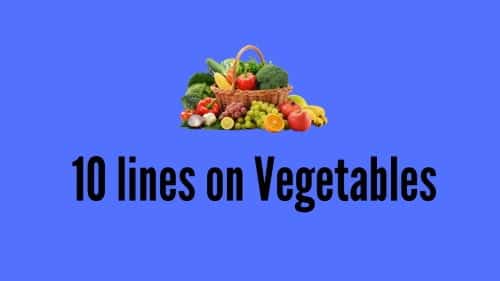Today, we are sharing 10 lines on vegetables This article can help the students who are looking for information about vegetables in English and Hindi. This essay is very simple and easy to remember. The level of this essay is moderate so any students can write on this topic. This article is generally useful for class 1 to class 12.
We hope you all liked this short article on vegetables in English. You can also use this article as 10 lines about vegetables in English in your school
10 lines on vegetables in English
1) Vegetables are the most important part of a meal.
2) Doctors also always recommend eating vegetables.
3) My favorite vegetable is onion.
4) Because it is very tasty to eat.
5) It is mostly eaten with roti.
6) It becomes very tasty when it is cooked with brinjal and potatoes.
7) It is grown in most of the countries of the continent of Asia.
8) Onion is rich in Vitamin A and Vitamin B.
9) It can be easily grown at home also.
10) Yar is a green vegetable which is easily available in the market.
10 lines on vegetables in Hindi
1) सब्जियां भोजन का सबसे महत्वपूर्ण हिस्सा हैं।
2) डॉक्टर भी हमेशा सब्जियां खाने की सलाह देते हैं।
3) मेरी पसंदीदा सब्जी प्याज है।
4) क्योंकि यह खाने में बहुत ही स्वादिष्ट होता है।
5) इसे ज्यादातर रोटी के साथ खाया जाता है।
6) बैगन और आलू के साथ पकाने पर यह बहुत ही स्वादिष्ट बनती है.
7) यह एशिया महाद्वीप के अधिकांश देशों में उगाया जाता है।
8) प्याज विटामिन ए और विटामिन बी से भरपूर होता है।
9) इसे घर पर भी आसानी से उगाया जा सकता है।
10) यार एक हरी सब्जी है जो बाजार में आसानी से मिल जाती है।
FAQ
Answer: Beta-carotene, found in orange fruit and vegetables such as carrots, sweet potatoes and pumpkins, and lutein, found in kale, papaya and spinach are both important for normal skin cell development and healthy skin tone.
Answer: Certain fruits such as oranges, bell peppers, guava, kiwi, tomatoes, and strawberries, contain high amounts of vitamin C. Vitamin C helps prevent brain cells from becoming damaged and supports overall brain health. In fact, a study found that vitamin C can potentially prevent Alzheimer’s.
Related Content
